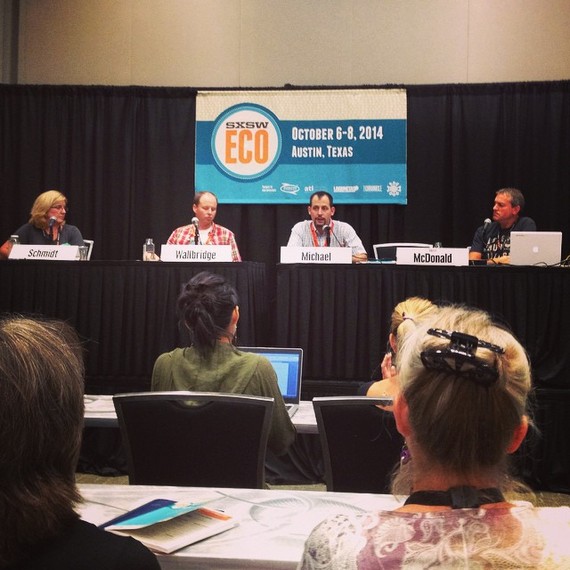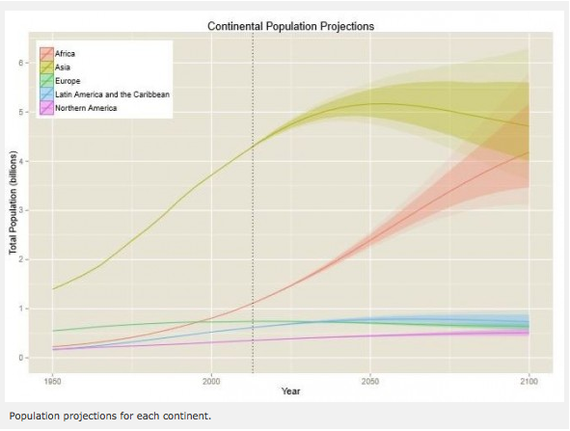
I attended my first SXSWeco, a gathering of a global community to explore, engage and co-create solutions for a sustainable world, this year. As I think back on the experience, it was a mix of unexpected events and people, which provided me with several takeaways that can teach us all some important lessons.
Population
When I think of "Eco", what comes to my mind is sustainability, conservation, wildlife, water, energy. One thing that surprised me in many of the sessions was the focus on population. From the first day, when our panel on "Farming to Feed 9 Billion" took place, I was immersed in conversations about population growth. A widely accepted forecast is for the world population to reach 9 billion by the year 2050.The two places growth will come from are Aisa, which is expected to level off by then, and Africa, which will be in the height of acceleration by 2050. This becomes part of the Eco conversation because a growing population means more people need to be fed, which takes more resources. Population creates a chain reaction, which is why several people I spoke with about population are also focused on women's rights and empowerment. 
http://earthsky.org/earth/world-population-unlikely-to-stabilize-this-century
Women
When you become aware of the population growth concerns, you meet people who are working on promoting women's rights and empowerment. In the US, we often hear about the pay disparity and workplace diversity challenges, especially in leadership positions. In the areas where population is expanding, there are issues we take for granted -- like girls having a right to get an education, women having a voice in family decisions, protection from physical violence, obstetric care -- that become major obstacles to overcome. Understanding and education is at the forefront of changing these issues. Women, who are aware of their rights, usually get access to a better education, healthier lives and a reduction in the number of births. The conversation about the global population growth and the focus on women taught me that if we start removing the barriers, we can start solving many of the issues our world is facing. It is possible.
Nature
Another enlightening realization came when I was invited to meet with M. Sanjayan, Executive Vice President and Senior Scientist at Conservation International. He shared the Nature Is Speaking campaign, which launched during SXSWeco. Hearing about the people involved in this campaign was impressive, but when you start hearing about how they are using voices and not faces. They wanted the familiar voices of celebrities, but didn't want their faces to make it seem like an endorsement. The trust of familiarity lead me to believe they were on to something. He talked about the relationship that they are hoping to create between people and nature by connecting the two in a meaningful way.
Transparency
We live in a world where the lines between work and life are more blurred than ever. I call it 'living" and stopped trying to find the blend or balance between the two. I was reminded that we are still far from everyone feeling this way. Many people are still trying to pursue a balance that I see as a myth.
I was moderating a panel on "Feeding To Farm 9 Billion." The three other panelists were farmers from across North America. They ranged in the size of their farms, what crops they grow, how they went to market and their experience with organic farming. The purpose of the panel was to share what local farmers have seen, and experienced, which might lead to some solutions on how we will have enough food to feed the growing world population.
All of us had been approached by Monsanto to see if we'd be interested in participating. They offered to cover our travel costs. That was all they asked for. We would have complete control of the content, questions and responses.
With my experience with SXSW, I knew there was nowhere to disclose who was paying the travel costs and have known many others who were paid to speak/attend and never disclosed who was paying their way. At the beginning our our session, I wanted to be transparent and share that our travel costs were sponsored and yet, our panel was pure in our excitement to share our personal viewpoints. At no point were any of us told what to talk about or not talk about.
On the last day of SXSWeco, a statement was made at a session organized by Mother Jones, that Monsanto had hijacked SXSWeco by not disclosing they had sponsored the panels. The conversation shifted from the Eco issues at hand to the politics. There has been a lot of back and forth on how this should have been handled, which questioned whether I disclosed my participation properly. There was questioning of a lack of transparency. It got me thinking of a number of levels about purpose. Overall, I am not sure what I could have done differently, but it is apparent that everyone has their own viewpoint on what transparency is engaged in a debate on right and wrong. When I step back, my question is different. I wonder if we missed an opportunity to build community and bring polarizing groups to start looking at solutions for the world, together.
Overall, SXSWeco opened my mind and heart to the importance non-environmental issues have on the environment, how #NatureIsSpeaking may connect us closer to nature, and how transparency can often cloud the issue. The bottom line is we need to figure out what conversations we should be having to bring people together to co-create a better world for all of us.
